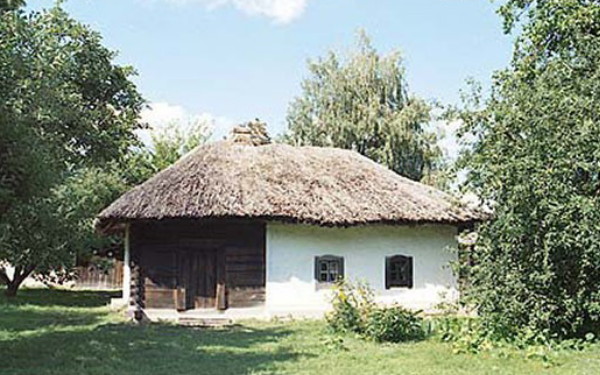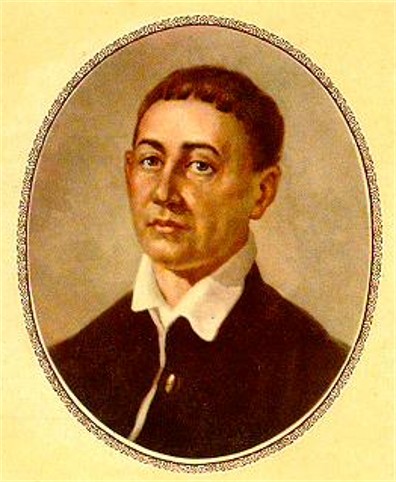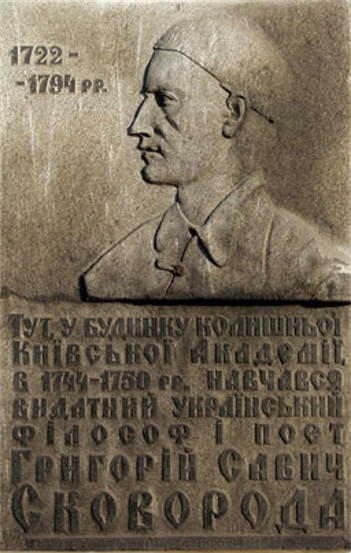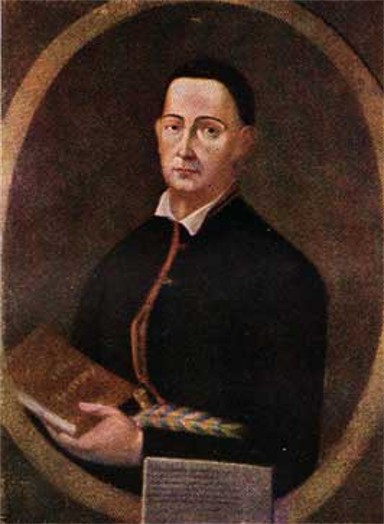Skovoroda, Hryhorii
Skovoroda, Hryhorii [Сковорода, Григорій], b 3 December 1722 in Chornukhy, Lubny regiment, d 9 November 1794 in Pan-Ivanivka, Kharkiv vicegerency (now Skovorodynivka near Zolochiv, Kharkiv oblast). Philosopher and poet. He was educated at the Kyivan Mohyla Academy (1734–53, with two interruptions). He sang in Empress Elizabeth I's court Kapelle in Saint Petersburg (1741–4), served as music director at the Russian imperial mission in Tokai, Hungary (1745–50), and taught poetics at Pereiaslav College (1751). He resumed his studies at the Kyivan academy, but left after completing only two years of the four-year theology course to serve as tutor to V. Tomara (1753–9). He spent the next 10 years in Kharkiv, teaching poetics (1759–60), syntax and Greek (1762–4), and ethics (1768–9) at Kharkiv College. After his dismissal from the college he abandoned any hope of securing a regular position and spent the rest of his life wandering about eastern Ukraine, particularly Slobidska Ukraine. Material support from friends enabled him to devote himself to reflection and writing. Most of his works were dedicated to his friends and circulated among them in manuscript copies.
Although there is no sharp distinction between Skovoroda's literary and philosophical works, his collection of 30 verses (composed from 1753 to 1785) titled Sad bozhestvennykh pesnei (Garden of Divine Songs), his dozen or so songs, his collection of 30 fables (composed between 1760 and 1770) titled Basni Khar’kovskiia (Kharkiv Fables), his translations of Cicero, Plutarch, Horace, Ovid, and Muretus, and his letters, written mostly in Latin, are generally grouped under the former category. Some of his songs and poems became widely known and became part of Ukrainian folklore. His philosophical works consist of a treatise on Christian morality and 12 dialogues.
Skovoroda's thought has been interpreted in different ways: as an eclectic, loose collection of ideas (F. Kudrinsky); as a strict, rationalist system (Aleksandra Yefymenko, H. Tysiachenko); as a form of Christian mysticism (V. Ern, Dmytro Chyzhevsky); as a version of Christian Platonism in the patristic tradition (Dmytro Bahalii); and as a moral philosophy (Fedir Zelenohorsky, Ivan Mirchuk, I. Ivano, Volodymyr Shynkaruk). There have been disagreements about the character of his metaphysical doctrine (dualism vs monism, idealism vs ‘semi-materialism’). The debates about its nature to a large extent have arisen because of Skovoroda's style of writing, which is literary rather than philosophical. His ideas are not organized and presented in a systematic way, but are scattered throughout his dialogues, fables, letters, and poetry. Skovoroda preferred to use symbols, metaphors, or emblems instead of well-defined philosophical concepts to convey his meaning. Moreover, he delighted in contradiction and often left it to readers to find their way out of an apparent one. In the absence of explicit statements of doctrine and expected solutions to obvious problems, it is sometimes uncertain what exactly Skovoroda had in mind.
For Skovoroda the purpose of philosophy is practical—to show the way to happiness. Hence, the two central questions for him are what happiness is and how it can be attained. For him happiness is an inner state of peace, gaiety, and confidence which is attainable by all. To reach this state, some understanding of the world and oneself and an appropriate way of life are necessary. Skovoroda approaches metaphysics and anthropology not as a speculative thinker, but as a moralist: he does no more than outline those truths that are necessary for happiness. His basic metaphysical doctrine is that there are two natures in everything: the ideal, inner, invisible, eternal, and immutable; and the material, outer, sensible, temporal, and mutable. The first is higher, for it imparts being to the second. This dualism extends through all reality—the macrocosm or universe, and the two microcosms of humanity and the Bible. In the macrocosm the inner nature is God, and the outer is the physical world. Skovoroda's view on God's relation to the world is panentheist rather than pantheist. In man the inner nature is the soul; the outer, the body. In the Bible the inner truth is the symbolical meaning; the outer, the literal meaning.
From this metaphysical scheme Skovoroda drew a number of fundamental conclusions for practical life. Since the universe is ordered by a provident God, every being has been provided with all that is necessary for happiness. The assurance that what is necessary is easy and what is difficult is unnecessary (for happiness) brings peace of mind. It also serves as a criterion for the material conditions of happiness: we need only those goods that are necessary to health and are available to all people. But to dispel anxiety about material security is not enough for happiness. Active by nature, humans must also fulfill themselves in action by assuming the congenial task or vocation assigned to them by God. To pursue one's task regardless of external rewards is to be happy, while to pursue wealth, glory, or pleasure through uncongenial work is to be in despair. Furthermore, since vocations are distributed by God in such a way as to ensure a harmonious social order, to adopt an uncongenial task leads to social discord and unhappiness for others.
The doctrine of congenial work is the central doctrine in Skovoroda's moral system. Although it is not metaphysically plausible, it expresses his faith in the creative potential of human beings and the possibility of self-fulfillment in this life for everyone. Although they were never presented in a systematic fashion, Skovoroda's ideas form a remarkably coherent system. His chief authorities are the ancient philosophers (the Stoics, the Cynics, Epicurus, Plato, and Aristotle), from whom he selects the basic elements of his own teaching. Following the patristic tradition, he treats the Bible allegorically: he holds that its literal meaning (anthropomorphic God and miracles) is external and false, and that its inner, symbolic meaning coincides with the truth known to the ancient philosophers. In this way he reconciles secular learning with Christian faith.
Skovoroda's influence in the 19th century on writers such as Ivan Kotliarevsky, Hryhorii Kvitka-Osnovianenko, Taras Shevchenko, and Panteleimon Kulish was minimal. But his poetic style, ideas, and moral example have played an important role in the rebirth of Ukrainian culture in the 20th century. Poets such as Mykola Filiansky, Pavlo Tychyna, Vasyl Barka, Vasyl Stus, Hryhorii Chubai, Ihor Kalynets, and Ivan Drach have found inspiration in him. The fullest editions of Skovoroda's works were published in Kharkiv in 1894 (ed Dmytro Bahalii), in Saint Petersburg in 1912 (ed Vladimir Bonch-Bruevich), in Kyiv in 1961 (2 vols) and 1973 (2 vols), and in Moscow in 1973 (2 vols). An English translation of Skovoroda's fables and aphorisms, together with a biography and an analysis of the works, was published by D.B. Chopyk in 1990. Skovoroda’s collected works in two volumes were published in Ukrainian translation in Kyiv in 1994 (the second, corrected edition appeared in 2005). The fullest and most comprehensive collection of Skovoroda’s works was prepared by Leonid Ushkalov and published in Kharkiv in 2011 by the Canadian Institute of Ukrainian Studies under the title Hryhorii Skovoroda: Povna akademichna zbirka tvoriv (Hryhorii Skovoroda: The Complete Academic Edition of Works).
BIBLIOGRAPHY
Ern, V. Grigorii Savvich Skovoroda: Zhizn’ i uchenie (Moscow 1912)
Pam’iati H.S. Skovorody (1722–1922): Zbirka stattiv (Odesa 1923)
Bahalii, D. Ukraïns’kyi mandrovanyi filosof Hryhorii Savych Skovoroda (Kharkiv 1926, repr Kyiv 1992)
Chyzhevs’kyi, D. Filosofiia H.S. Skovorody (Warsaw 1934)
Zakydalsky, T. ‘The Theory of Man in the Philosophy of Skovoroda,’ M.A.thesis (Bryn Mawr College 1965)
Red’ko, M. Svitohliad H. S. Skovorody (Lviv 1967)
Berkovych, E.; Stavyns’ka, R.; Shtraimysh, R. (comps). Hryhorii Skovoroda: Biobibliohrafiia (Kharkiv 1968)
Popov, P. Hryhorii Skovoroda (Kyiv 1969)
Nizhenets’, A. Na zlami dvokh svitiv (Kharkiv 1970)
Kovalivs’kyi, A. (ed). Hryhorii Skovoroda: Biobibliohrafiia (Kyiv 1972)
Makhnovets’, L. Hryhorii Skovoroda: Biohrafiia (Kyiv 1972)
Shynkaruk, V. (ed). Filosofiia Hryhoriia Skovorody (Kyiv 1972)
Tschizewsky, D. Skoworoda: Dichter, Denker, Mystiker (Munich 1974)
Myshanych, O. Hryhorii Skovoroda i usna narodna tvorchist’ (Kyiv 1976)
Ivan’o, I. Filosofiia i styl’ myslennia H. Skovorody (Kyiv 1983)
Nichyk, V. (ed.) Skovoroda Hryhorii: Doslidzhennia, rozvidky, materialy: Zbirnyk naukovykh prats' (Kyiv 1992)
Ushkalov, L., Marchenko, O. Narysy z filosofii Hryhoriia Skovorody (Kharkiv 1993)
Marshall, R. Jr. and T. Bird. (eds). Hryhorii Savyč Skovoroda: An Anthology of Critical Articles (Edmonton–Toronto 1994)
Myshanych, O. Hryhorii Skovoroda: Narys zhyttia i tvorchosti (Kyiv 1994)
Valiavko, I. Filosofiia Hryhoriia Skovorody v osmyslenni Dmytra Chyzhevs'koho (Kyiv 1996)
Special Issue on Hryhorii Skovoroda, Journal of Ukrainian Studies, Vol. 22, nos. 1–2, Summer–Winter 1997
Ushkalov, L. Hryhorii Skovoroda i antychna kul'tura (Kharkiv 1997)
Malinov, A. Filosofskie zzgliady Grigoriia Skovorody (Saint Petersburg 1998)
Kravets, V. Razgovor o Skovorode: S prilozheniem khrestomatii po Skovorodovedeniiu (Kyiv 2000)
Teteryna, D. Hryhorii Skovoroda: Ukrains'kyi pys'mennyk, filosof i pedahoh (Kyiv–Munich 2001)
Ushkalov, L. Ukraïns’ke barokove Bohomyslennia: Sim etiudiv pro Hryhoriia Skovorodu (Kharkiv 2001)
Hamalii, H., Shevchenko, V., Zhdanova R. Hryhorii Skovoroda, 1722–1794: Bibliohrafichnyi pokazhchyk (Kyiv 2002)
Horbach, N. Nevidomyi Hryhorii Skovoroda (Lviv 2002)
Shtykh, V., Dudko D. Hryhorii Skovorda v spohadakh suchasnykiv i narodnykh lehendakh (Kharkiv 2002)
Sofronova, L. Tri mira Grigoriia Skovorody (Moscow 2002)
Ushkalov, L. Dva stolittia Skovorodiiany: Bibliohrafichnyi dovidnyk (Kharkiv 2002)
Kozarezova, O. Chelovek i mir v filosofii G. Skovorody (Moscow 2004)
Ushkalov, L. Hryhorii Skovoroda: Seminarii (Kharkiv 2004)
Erdmann, E. Unähnliche Ähnlichkeit: Die Onto-Poetik Des Ukrainischen Philosophen Hryhorij Skovoroda (1722–1794) (Cologne 2005)
Kupchyns'kyi, O. Hryhorii Skovoroda: Zahadkovist' prysutnosty; (Materialy konferentsii, prysviachenoi 280-richchiu vid narodzhennia Hryhoriia Skovorody) (Lviv 2005)
Ushkalov, Leonid. Skovoroda ta inshi: Prychynky do istoriï ukraïns’koï literatury (Kyiv 2007)
Shevchuk, Valerii. Piznanyi i nepiznanyi Sfinks: Hryhorii Skovoroda suchasnymy ochymy: Rozmysly (Kyiv 2008)
Pylypiuk, Natalia, and Oleh Ilnytzkyj. Online Concordance to the Complete Works of Hryhorii Skovoroda (2009) www.artsrn.ualberta.ca/skovoroda/
Taras Zakydalsky
[This article was updated in 2007.]




